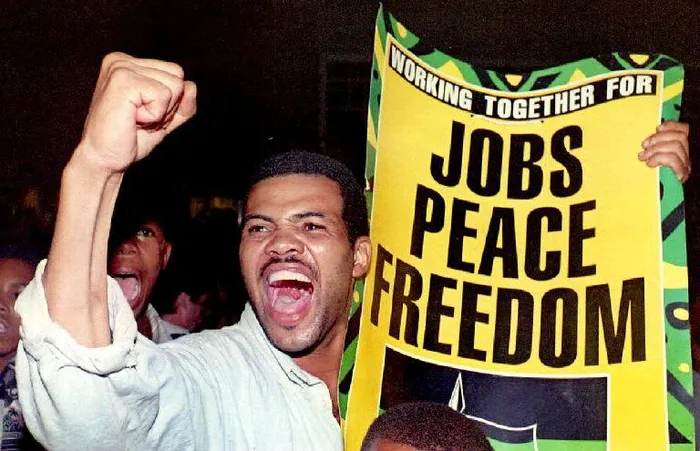The National Dialogue must not be derailed by political gaslighting

AN ANC supporter with an election manifesto poster a election campaign meeting in Promosa, Potchefstroom on January 30, 1994. The democratic breakthrough of 1994 was not just a political event. It delivered the keys of the Republic to those long locked outside the gates of history, says the writer.
Image: AFP
Zamikhaya Maseti
The 15th of August 2025 has been etched into the political calendar as a historic moment, the National Dialogue. At its most aspirational, it is meant to be a nation-defining platform, a civic summit for collective introspection, healing, and democratic recommitment. But even before its formal commencement, this national project risks being engulfed by the shallow political theatrics and elite tantrums that have paralysed genuine nation-building for far too long.
Chief among the culprits is the Democratic Alliance (DA), which is now using the recent dismissal of Deputy Minister Andrew Whitfield, a figure occupying neither Cabinet status nor National Executive prominence, as a spark to fuel political hysteria. Let it be clear: this is not statesmanship. It is a political gaslighting strategy, a sophisticated act of deflection designed to distract South Africans from the essential questions we ought to be confronting.
This political fracas, if anything, is a sobering reminder. It compels us, the ordinary and long-suffering South Africans, the real stakeholders in the future of this nation, to seize the agenda of the National Dialogue. We dare not allow it to be captured by those who wish to reduce this opportunity into a partisan tug-of-war. It must speak with bold honesty to the crises that are tearing our country limb from limb.
South Africa, make no mistake, stands on the precipice of an abyss. What we are facing is not merely policy failure; it is the slow, corrosive disintegration of the national soul. Crime is no longer a statistic; it is a mode of life. Corruption is no longer a scandal; it is an ecosystem. Social cohesion, once the backbone of our fragile reconciliation, is unravelling under the weight of poverty, lawlessness, and deepening racial resentment. The rainbow has dimmed to a monochrome of despair and distrust.
We are not yet a failed State. But with each passing day, with each institution that crumbles and each promise betrayed, we edge closer to that dreaded status. What once made South Africa the miracle of the world has now been bludgeoned by mediocrity, political cannibalism, and the fossilisation of revolutionary ideals.
The May 29, 2024, General Elections offered perhaps the clearest mirror to our political malaise. Voter apathy was not apolitical. It was a mass indictment, a statement of no confidence in a political system that feels increasingly like an exclusive game played above the heads of the governed. People's faith in democracy is no longer low; it is at the ankles, dragging itself in the dust of betrayal.
Therefore, it is not negotiable: the very first item on the agenda of the National Dialogue must be governance. Not in the abstract, but the brutally honest question: How have we been governed since 1994? When did the wheels fall off? At which exact moment did the promise of liberation give way to elite accumulation, State capture, and rudderless bureaucracy?
The democratic breakthrough of 1994 was not just a political event; it was a civilizational rupture. It delivered the keys of the Republic to those long locked outside the gates of history. The masses, the historically despised Third Estate, took to the streets in euphoric celebration, believing that their day under the sun had finally arrived. And it did, briefly.
But somewhere between Kliptown and the Union Buildings, between The People Shall Govern and parliamentary privilege, the democratic vehicle began to wobble. The tyres of accountability deflated. The engine of ethical leadership began to cough and stall. The Dialogue must, therefore, perform a thorough diagnostic inspection of this vehicle, note every point of mechanical failure, and commit to firm, unapologetic, and irreversible repairs.
Among the most urgent repairs is the deconstruction of the neo-patrimonial political culture that has infected our post-1994 polity. This culture, rooted in patronage, personality cults, and informal networks of loyalty, has turned public office into private inheritance and governance into transactional loyalty schemes. It must be dislodged root and branch if democracy is to breathe again.
But systemic repair is not merely the work of the elite. A return to grassroots democracy is indispensable. The people, the ones who queued in '94 with trembling hope, must be brought back to the centre of governance, not as passive spectators but as active architects. Civil society, social movements, religious bodies, worker organisations, youth formations, these are not side actors; they are the real Parliament of the People.
We must then reimagine citizenship, not as periodic voting, but as perpetual participation. The strengthening of civic institutions and the rebirth of an active citizenry is the only credible antidote to elite capture and democratic decay.
Ultimately, the National Dialogue must restore the central promise uttered boldly 70 years ago in Kliptown: “The People Shall Govern.” That is not a slogan. It is a covenant. And covenants, once broken, demand not just apologies but repair, repentance, and recommitment.
Let us, therefore, put back the wheels that fell off the democratic vehicle. Let us take the Dialogue back from political actors playing hide-and-seek with our future. Let us, the people, write the next chapter of our nation, not with ink, but with intention.
For if we do not steer the vehicle back onto the road, history will not be kind. And we will have no one to blame but ourselves.
* Zamikhaya Maseti is a Political Economy Analyst with a Magister Philosophiae (M. PHIL) in South African Politics and Political Economy from the University of Port Elizabeth (UPE), now known as the Nelson Mandela University (NMU).
** The views expressed do not necessarily reflect the views of IOL, Independent Media or The African.